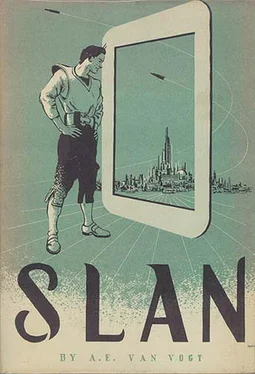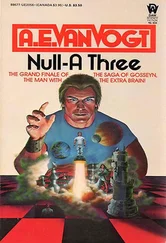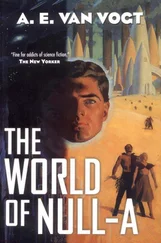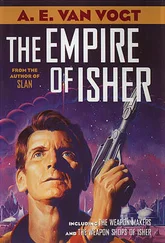"Granny!" Cross said, "can't you suppress your murderous instincts?"
The old lady glanced up at him, and there was a belligerent thrust in her wrinkled, kindly face that was reminiscent of the old Granny.
"Nonsense!" she snapped. "For ninety years now, I've killed the little devils, and my mother before me had it in for 'em too, heh, heh!"
Her giggle sounded senile. Cross frowned faintly. Granny had thrived physically in this West Coast climate, but he was not satisfied with his hypnotic reconstruction of her mind. She was very old, of course, but her constant use of certain phrases, such as the one about what she, and her mother before her, had done, was too mechanical. He had impressed the idea upon her in the first place to fill the enormous gap left by the uprooting of her own memories, but one of these days he'd have to try again. He started to turn away; and it was at that moment that the warning tingled into his brain, a sharp pulsing of faraway outside thoughts. "Airplanes!" people were thinking. "So many planes!"
It was years now since Jommy Cross had implanted the hypnotic suggestion that everybody who saw anything unusual in the valley was to signal through their subconscious, without themselves being aware of the act. The fruits of that precaution came now in the wave after wave of warning from dozens of minds.
And then he saw the planes, specks diving over the mountain heading in his general direction. Like a striking mongoose, his mind lashed out toward them, reaching for the minds of the pilots. Taut-held brain shields of tendrilless slans met that one, searching glance. In full racing stride he snatched Granny from the ground; and then he was in the house. The ten-point steel door of that ten-point steel house swung shut – even as a great, glistening, jet-propelled troop carrier plane settled like a gigantic bird among the flowers of Granny's garden.
Cross thought tensely: "A plane in every farmyard. That means they don't know exactly which one I'm in. But now the spaceships will arrive to finish the job. Thorough!"
Well, so had he been thorough, and it was obvious, now that his hand was forced, that he must push his own plan to the limit. He felt supremely confident, and there was still not a doubt in him.
Doubt and dismay came a minute later, as he stared into his underground visiplate. The battleships and cruisers were there all right, but something else, too – another ship. A ship! The monster filled half the visiplate, and its wheel-shaped bulk sprawled across the lower quarter of the sky. A half-mile circle of ship, ten million tons of metal, floating down fighter than air, like a buoyant flattened balloon, gigantic, immeasurably malignant in its sheer threat of unlimited power.
It came alive! A hundred-yard beam of white fire flared from its massive wall – and the solid top of the mountain dissolved before that frightful thrust. His mountain, where his ship, his life, was hidden, destroyed by controlled atomic energy.
Cross stood quite still there on the rug that covered the steel floor of that steel laboratory. Wisps of human in-coherency from every direction fumbled at his brain. He flung up his mind shield, and that distracting confusion of outside thought was cut off abruptly. Behind him, Granny moaned in gentle terror. In the distance above him, sledgehammer blows were lashing at his almost impregnable cottage, but the dim bedlam of noise failed to touch him. He was alone in a world of personal silence, a world of swift, quiet, uninterrupted thought.
If they were prepared to use atomic energy, why hadn't they pulverized him with bombs? A thousand coordinating thoughts leaped up to form the simple answer. They wanted his perfect type of atomic energy. Their method was not a development of the rather superb, so-called hydrogen bomb of old times, with its heavy water and uranium base, and chain reaction. They had gone back to an even earlier stage, a crude expansion of the cyclotron principle. That alone could explain so much size. Here was a ten-million-ton cyclotron, capable of a wild and deadly spray of energy – and they undoubtedly hoped to use its mobility to force him to give them his priceless secret.
He whirled toward the instrument board that spread across the entire end of the laboratory. A switch clicked. Pointers set rigid. And dancing needles told the story of a spaceship out there under that dissolving mountain, a ship shuddering with mechanical life, now automatically burrowing deeper into the ground, and at the same time heading unerringly toward this laboratory.
A dial spun, and a whole bank of needles in their transparent cases danced from zero to the first fractional point, and wavered there. They, also, told a story – the story of atomic projectors rearing up from the ground where they had been hidden so long – and as he grasped the precision instrument that was his aiming device, twenty invincible guns out there swung in perfect synchronization.
The hairline sights edged along the unmissable spread of the ship's bulk. And paused. What was his purpose against these ruthless enemies? He didn't want to bring that monster machine to earth. He didn't want to create a situation where slans and humans beings might launch into a furious struggle for the possession of the wreck. There was no doubt that the human beings would fight with a fearless ferocity. Their great mobile guns could still hurl shells capable of piercing any metal in the possession of the slans. And if any of those ships with their superior armaments ever fell into human hands, then it would be no time at all before they, also, had spaceships; and the devil's war would be on. No, he didn't want that.
And he didn't want to destroy the ship because he didn't want to kill the tendrilless slans who were in it. For, after all, tendrilless slans did represent a law and order which he respected. And because they were a great race, and definitely kin to him, they merited mercy.
Before that clarification, hesitation fled. Straight at the center of that immense cyclotron, Cross aimed his battery of synchronized weapons. His thumb pressed down the-fire button. Above him, the half mile of spiral-shaped ship recoiled like an elephant struck an intolerable blow. It rocked madly, like a ship in stormy seas. And briefly, as it swung sickeningly, he saw blue sky through a gaping hole – and realized his victory.
He had cut that vast spiral from end to end. In every turn of it now was a hopelessly diffusing leak. No stream of atoms, however accelerated, could run that gauntlet un-mutilated. The power of the cyclotron was smashed. But all the implications of that ship remained. Frowning, Cross watched the ship poise for a moment, shakily. Slowly it began to recede, its antigravity plates apparently full on. Up, up it mounted, growing smaller as it withdrew into the distance.
At fifty miles it was still bigger than the battleships that were nosing down toward that green, almost unharmed valley. And now the implications were clearer, colder, deadlier. The nature of their attack showed that they must have spotted his activities in this valley months ago.
Clearly, they had waited until they could approach in one titanic, organized battle, with the purpose of forcing him out where they could follow him night and day by means of their instruments and so, by sheer weight of numbers and guns, destroy him and capture his equipment.
Dispassionately, Cross turned to Granny. "I'm going to leave you here. Follow my instructions to the letter. Five minutes from now, you will go up the way we came down, closing all the metal doors behind you. You will then forget all about this laboratory. It is going to be destroyed, so you might as well forget. If men question you, you will act senile, but at other times you will be normal. I'm leaving you to face that danger because I'm no longer sure, in spite of my precautions, that I can come out of this alive."
Читать дальше











